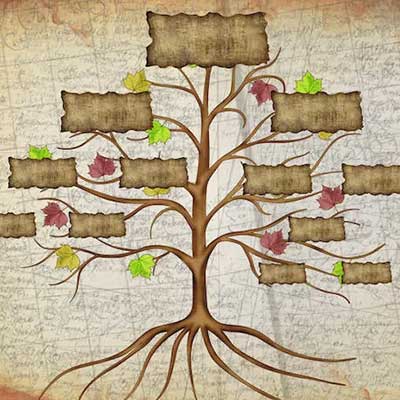- Home
- Importance of Family Storytelling
- Archives Family History
A Guide to Archives Family History: Unlocking the Past
Dive into archives family history to uncover your ancestors' stories. Learn how to access, interpret, and preserve historical records to piece together your family's past.
Archiving family history is a fascinating journey into the past, offering a unique window into the lives of our ancestors. This comprehensive guide explores the significance of archives in family history research, providing valuable insights and practical advice for beginners and seasoned genealogists. By delving into various types of archives and utilizing digital resources, you can uncover hidden stories and forge a deeper connection with your heritage.
Introduction to Archives Family History
Understanding the importance of archives in preserving family history is crucial for anyone embarking on genealogical research. Archives serve as custodians of the past, housing a treasure trove of documents, photographs, and records that tell the stories of individuals, families, and communities. These records offer glimpses into personal histories and provide context for understanding broader historical events and societal changes.
Starting Your Journey
Embarking on a family history research project can be daunting, but with the proper preparation and tools, it becomes an exciting exploration. This section outlines essential steps for getting started, including gathering initial information, identifying resources, and developing a research plan.
Types of Archives
Discover the diversity of archives family history is available to family history researchers, from national repositories to local and state archives and specialized collections. Each archive type offers unique resources; understanding their differences is key to a successful search.
Digital Archives and Online Resources
The digital age has transformed family history research, making countless records accessible from the comfort of home. This section navigates through online databases and websites essential for genealogical research, highlighting how to use these tools to find relevant information effectively.
Reading Old Documents
Old documents are gateways to the past, but they often come with challenges, such as difficult handwriting and obsolete language. Learn techniques for deciphering these documents and their historical context to extract valuable information.
Case Studies: Success Stories
Real-life success stories illustrate the potential of archives family history research to uncover remarkable stories. From tracing lineage through military records to discovering immigrant ancestors, these case studies provide inspiration and practical insights.
Organizing Your Findings
As your research progresses, organizing your findings becomes crucial. This section covers digital and physical methods for organizing documents, photos, and records, ensuring that your family history is preserved for future generations.
Ethical Considerations in Research
Family history research involves handling personal and sometimes sensitive information. This section emphasizes the importance of ethical research practices, including respecting privacy and being mindful of shared information.
Interviewing Relatives
Interviewing relatives can unearth personal stories and details not found in official records. This section offers tips on preparing questions, conducting interviews, and preserving oral histories as part of your family archive.
Using Census Records
Census records are invaluable for family history research, providing snapshots of ancestors' lives at ten-year intervals. Learn how to extract and interpret information from these records, including household composition, occupations, and birthplaces.
Exploring Land and Property Records
Land and property records can reveal much about an ancestor's life and financial status. This section guides you through understanding and accessing these records, offering insights into historical land ownership and residence patterns.
Military Records and Draft Registrations
Military records and draft registrations offer detailed information about ancestors who served in the armed forces. Discover what these records can tell you about your family's military history and how to access them.
Immigration and Naturalization Records
For many, tracing the journey of immigrant ancestors is a central part of family history research. This section explores key records and databases for tracking immigration and naturalization, helping you understand your ancestors' arrival and life in a new land.
DNA Testing and Genetic Genealogy
 DNA testing has revolutionized genealogy, enabling connections with relatives based on genetic markers.
DNA testing has revolutionized genealogy, enabling connections with relatives based on genetic markers.DNA testing has revolutionized genealogy, enabling connections with relatives based on genetic markers. Understand how DNA testing works and how it can complement traditional research methods to uncover family connections.
Archives Family History by Restoring and Preserving Family Photos and Documents
Preserving family history involves more than collecting records; it's also about caring for them. Learn techniques for restoring and preserving photos and documents to ensure they endure for generations.
Legal Documents in Family History
Legal documents like wills, probate records, and vital records are rich sources of information. Explore how these documents can enhance family history research, offering insights into ancestors' lives, relationships, and society.
Sharing Your Family History
Sharing your family history research can be rewarding, whether through creating a family history book or using digital platforms. This section explores ways to share your discoveries, engaging family members and connecting with a wider community of genealogists.
The Future of Archives Family History
The future of archives family history is bright, with technological advances and a growing community of family historians. As we continue to uncover and preserve our ancestral stories, we honor our past and enrich our present and future connections.
FAQs
- How do I start researching my family history in archives?
- What are the best online resources for family history research?
- How can I decipher old handwriting in historical documents?
- What should I do if I hit a dead end in my research?
1. How do I start researching my family history in archives?
Researching your family history in archives is a rewarding journey that connects you to your past, uncovering stories and insights about your ancestors. Here's how to begin this fascinating exploration:
1. Gather Preliminary Information: Start with what you know. Collect as much information as possible from family members, including names, dates, and places related to births, marriages, deaths, and significant events. Family artifacts like old photos, letters, and documents can provide valuable clues.
2. Organize Your Findings: Use a digital tool or a traditional notebook to organize your collected information. Creating a family tree can help visualize connections and identify gaps in your knowledge.
3. Set Research Goals: Decide what you want to learn about your family history. Focusing on specific questions or individuals can help direct your research efforts more effectively.
4. Identify Relevant Archives: Identify archives that may hold relevant records based on the geographic locations and periods you're interested in. This could include national, state, or local archives, as well as specialized archives like religious, ethnic, or military archives.
5. Learn About the Archives' Collections: Visit the websites of identified archives to learn about their collections and how they can be accessed. Many archives provide online catalogs or guides that can help you determine if they hold records relevant to your research.
6. Contact the Archives: Contact the archives for guidance on accessing their collections. Staff can provide valuable advice on navigating their records and may suggest other resources to consult.
7. Plan Your Visit: Plan a visit if the archives are inaccessible online. Please ensure you understand the archives' rules, hours of operation, and any fees associated with accessing or copying documents.
8. Use Digital Resources: Many archives offer digital collections that can be accessed remotely. Explore online databases, digitized records, and digital archives to continue your research from home.
9. Document Your Sources: Keep detailed records of your sources as you find information. This is crucial for verifying facts and revisiting sources if needed.
10. Stay Organized and Persistent: Family history research is often a long and iterative. Keep your findings organized, and don’t be discouraged by dead ends. New records and resources can always emerge.
11. Join a Community: Consider joining genealogical societies or online forums. These communities can provide support, advice, and valuable connections to others researching similar backgrounds.
12. Review and Share Your Research: Review your findings to identify new questions or research avenues. Sharing your discoveries with family members can also uncover new information and stories.
Remember, researching family history is a journey that can take unexpected turns, revealing fascinating stories about your ancestors' lives and their times. Each piece of information adds to the rich tapestry of your family's past.
2. What are the best online resources for family history research?
The quest for family history has been significantly simplified and enriched by a plethora of online resources. These platforms provide access to millions of records, including census data, birth, marriage, and death records, immigration and military records, and much more. Here's a list of some of the best online resources for family history research:
1. Ancestry.com: One of the largest and most well-known genealogy websites, Ancestry.com offers access to a vast array of records worldwide. Its intuitive interface and tools for building family trees make it a favorite among genealogists.
2. FamilySearch.org: Operated by The Church of Jesus Christ of Latter-day Saints, FamilySearch is a free resource that provides access to a massive collection of genealogical records, including unique documents not available elsewhere. Its extensive catalog covers records from over 100 countries.
3. MyHeritage.com: Offering a similar service to Ancestry, MyHeritage has a solid international presence, making it particularly useful for research in Europe and other regions. It also offers DNA testing services for genealogical purposes.
4. FindMyPast.com: Specializing in UK and Irish records, FindMyPast is an excellent resource for those researching ancestors from these areas. It offers a range of records, including parish and British military records.
5. The USGenWeb Project: This volunteer-driven project provides free access to a wealth of genealogical resources organized by state and county. It's particularly useful for U.S. research, offering everything from transcribed documents to advice on local research.
6. National Archives and Records Administration (NARA): NARA's website (archives.gov) is an invaluable resource for U.S. family history research, providing access to census records, military records, immigration records, and more.
7. Library of Congress: The Library of Congress offers a variety of historical collections that can be useful for genealogical research, including newspapers, photographs, and maps.
8. Ellis Island Foundation: For those researching ancestors who immigrated through Ellis Island, this website offers access to passenger lists and other valuable immigration records.
9. GenealogyBank.com: Specializing in historical newspapers, GenealogyBank provides access to a vast archive of newspapers from across the United States, offering a unique glimpse into ancestors' daily lives and times.
10. Chronicling America: Operated by the Library of Congress, this website offers free access to a vast database of digitized newspapers across the United States from 1789 to 1963.
11. DNA Testing Services: Websites like 23andMe and AncestryDNA offer DNA testing for genealogical purposes and provide tools for connecting with genetic relatives and understanding ancestral origins.
Each resource has its strengths and specializes in different types of records or geographic areas. It's often beneficial to use a combination of these resources to gather a comprehensive picture of your family history. Remember, while many of these resources offer free access to some records, others may require a subscription or payment to access full databases and documents.
3. How can I decipher old handwriting in historical documents?
Deciphering old handwriting in historical documents can be challenging, especially when dealing with styles and conventions that have evolved or become obsolete. However, with patience, practice, and the right strategies, you can learn to read these documents more effectively. Here are some tips to help you decipher old handwriting:
1. Familiarize Yourself with Historical Handwriting Styles: Handwriting has changed significantly. Familiarizing yourself with the common period styles you're researching, such as Copperplate, Spencerian, or Palmer Method, can help. Online tutorials and reference guides can be invaluable for understanding these styles.
2. Start with Known Words: Identify words you can easily recognize. Names of places, dates, and common words like "the," "and," "birth," and "death" can provide context and help you get accustomed to the writer's style.
3. Use Alphabet Guides: Alphabet guides show how each letter was formed in different historical handwriting styles. Comparing letters in your document to these guides can help you identify individual characters.
4. Practice Makes Perfect: Transcribe documents by describing what you see. This practice can help you become more familiar with handwriting and improve your reading ability.
5. Look for Patterns: Handwriting is often consistent in its idiosyncrasies. Once you identify how a particular writer forms certain letters or words, you can apply this knowledge to decipher more challenging text parts.
6. Use Context Clues: The context of the document can provide hints about its content. Knowing the historical and geographical context can help you make educated guesses about unfamiliar words or phrases.
7. Consult Transcribed Documents: Look for transcribed versions of similar documents for comparison. Seeing how others have interpreted similar handwriting can provide clues and confirm your readings.
8. Ask for Help: Online forums and genealogy groups are full of experienced researchers who may be able to help you decipher difficult passages. Please don't hesitate to reach out for help.
9. Take Breaks: If you're struggling with a complicated piece of handwriting, taking a break can help. Returning with fresh eyes will often reveal patterns or letters you didn't notice before.
10. Utilize Online Tools: Some websites and tools are designed to help decipher old handwriting. For example, the "Scripto" tool on FamilySearch allows users to practice reading and transcribing documents.
11. Attend Workshops or Webinars: Many genealogical societies and archives offer workshops on reading old handwriting. These can provide expert guidance and practical tips.
12. Compare with Contemporary Documents: Viewing other documents from the same period and region can help you become accustomed to the era's common writing styles and abbreviations.
Remember, deciphering old handwriting is a skill that improves with time and practice. Be patient with yourself, and celebrate your progress, no matter how small. Each word you decipher is a step closer to unlocking your ancestors' stories.
4. What should I do if I hit a dead end in my research?
Hitting a dead end in family history research is a common challenge, but it doesn't mean your exploration has to end. Here are strategies to help you navigate through these roadblocks and potentially uncover new avenues of research:
- Re-examine Existing Information: Sometimes, the key to breaking through a dead end is already in your possession. Review your collected information for any missed clues or details that might lead you in a new direction.
- Broaden Your Search: Consider broadening your search if you've focused on a specific individual or source. Look into siblings, cousins, and other relatives of your ancestors. Sometimes, records related to them can provide unexpected insights into your direct ancestors.
- Explore Alternative Sources: If the usual records (birth, marriage, death) aren't yielding results, explore alternative sources such as land records, wills, probate records, court documents, occupational records, military records, or newspaper archives. These can often provide valuable information.
- Use Wildcards in Searches: When dealing with online databases, using wildcards (*) to replace letters in a surname can help you find records that may have been misspelled or indexed incorrectly.
- Seek Out Local Resources: Local libraries, historical societies, and genealogical societies often have unique resources not available online, such as family files, local histories, and records of local businesses and organizations.
- Contact Living Relatives: Reach out to more distant or potential relatives you have yet to speak to. They might have stories, documents, or photographs to provide new leads.
- Post Queries in Online Forums: Online genealogy forums and social media groups can be beneficial. Post detailed queries about your dead end, and you might receive new suggestions or information from fellow researchers.
- Consider DNA Testing: If you haven't already, consider taking a DNA test. The results can connect you with distant relatives who may have information on the family branch you're stuck on.
- Hire a Professional Genealogist: If you're stuck and have the means, consider hiring a professional genealogist specializing in the area or period you're researching. They might have access to resources you don't and can provide a fresh perspective.
- Take a Break: Sometimes, stepping away can provide new insights. Taking a break can help you return to research with fresh eyes and new ideas.
- Attend Workshops and Conferences: Genealogy workshops and conferences can be great places to learn new research techniques and to network with other genealogists who might offer new insights or approaches.
- Check Neighboring Areas: If searching for records in a specific location, try expanding your search to neighboring towns, counties, or states. Families often move short distances, and documents may be filed in a nearby jurisdiction.
- Utilize Social History: Understanding the social history of your ancestors' time and place can provide clues about where to look next. Economic downturns, wars, epidemics, and migrations can all affect where records might be found.
- Review Your Research Goals: Please look at what you're trying to discover and why. This can help you identify a different angle or an overlooked aspect of your research.
Encountering a dead end in genealogical research is an opportunity to think creatively and explore new resources. With persistence, flexibility, and luck, you can often find a way to move your research forward.















